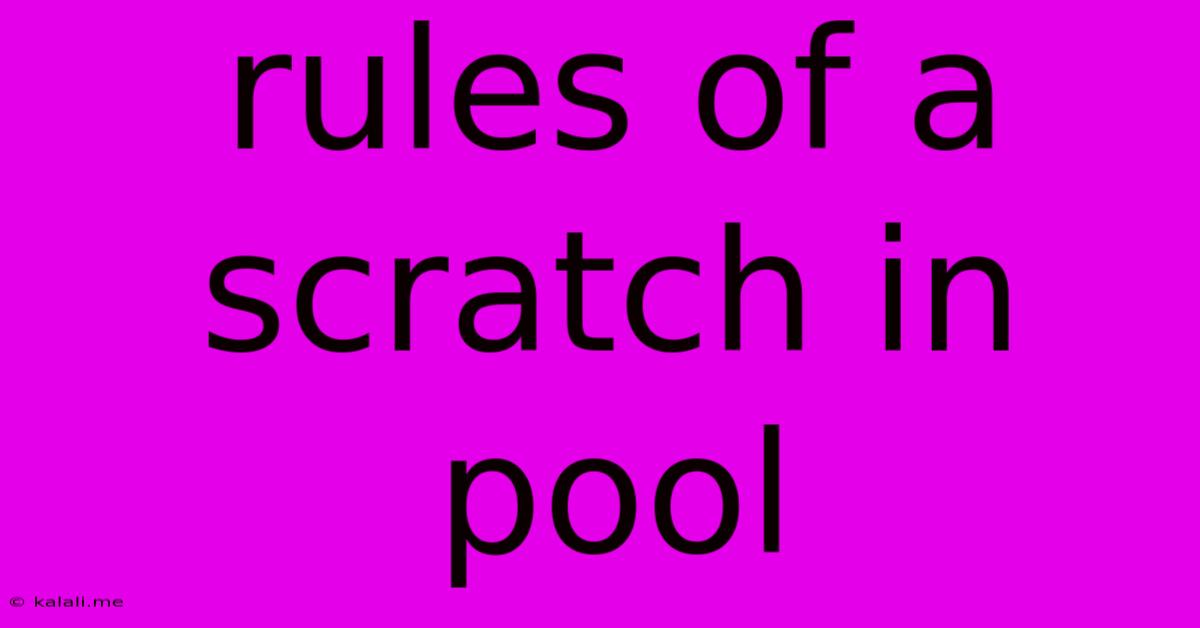Rules Of A Scratch In Pool
Kalali
May 30, 2025 · 3 min read

Table of Contents
The Definitive Guide to Scratching in Pool: Rules, Strategies, and Avoiding Them
So, you're playing a game of 8-ball, 9-ball, or another variation of pool, and you've just committed the ultimate faux pas – a scratch. This seemingly simple action can drastically alter the course of a game, leading to lost balls, conceded points, and even a complete shift in momentum. This article will clarify the rules surrounding scratches in pool, explore strategies for avoiding them, and help you navigate this crucial aspect of the game.
What constitutes a scratch in pool? A scratch occurs when, during your turn, the cue ball is pocketed or leaves the table entirely. This simple definition, however, has nuanced implications depending on the specific game being played.
Understanding the Different Types of Scratches
- Pocketing the cue ball: The most common scratch. If the cue ball ends up in any pocket, it's a scratch.
- Cue ball leaving the table: Just as damaging as pocketing the cue ball. If the cue ball goes off the table completely, it's also considered a scratch.
- Jump shots leading to a scratch: If a jump shot results in the cue ball pocketing or leaving the table, this counts as a scratch, regardless of whether you made the intended shot.
Consequences of Scratching
The penalties for scratching vary depending on the ruleset of the particular game:
- 8-Ball: In 8-ball, a scratch usually results in your opponent taking ball-in-hand. This means they can place the cue ball anywhere on the table to their advantage. This can significantly impact the game and potentially lead to your opponent clearing the table.
- 9-Ball: Similar to 8-ball, a scratch in 9-ball typically results in ball-in-hand for your opponent, giving them a substantial strategic advantage.
- Other games: Other variations of pool, such as straight pool or one-pocket, have specific rules regarding scratches. These rules may involve assigning points to the opponent or other game-specific penalties.
Strategies for Avoiding Scratches
Preventing scratches is key to consistent pool performance. Here are some tips to minimize your risk:
- Safe play: When unsure of a shot, prioritize a safe play over a risky shot that could result in a scratch. A safe position is more valuable than a potentially missed shot.
- Cue ball control: Mastering cue ball control is fundamental to preventing scratches. Practice your stroke and aim to ensure the cue ball stays within a manageable area on the table.
- Shot selection: Carefully evaluate each shot. Consider the angle of approach, the speed of the shot, and the possible consequences of a miss.
- Spin and English: Utilize spin (English) to control the cue ball's trajectory and prevent it from entering a pocket unintentionally.
- Practice: Consistent practice is the most effective way to refine your skills and reduce the frequency of scratches.
Advanced Techniques to Mitigate Risk
- Defensive shots: Learning to execute defensive shots effectively minimizes the chances of inadvertently scratching while still creating obstacles for your opponent.
- Positional play: Focus on leaving the cue ball in a favorable position for your next shot, rather than only focusing on pocketing the object ball. This reduces the chance of taking an unnecessary risk.
By understanding the rules surrounding scratches in pool, implementing effective strategies, and consistently practicing your game, you'll significantly reduce the frequency of scratches and improve your overall performance. Remember, avoiding scratches isn't just about following the rules; it's a fundamental aspect of strategic gameplay.
Latest Posts
Latest Posts
-
How Do You Make A Grid In Photoshop
May 31, 2025
-
Youtube Glitch Wont Play Video Fastforwards To The End
May 31, 2025
-
Russian Quote About Finishing Something When You Start It
May 31, 2025
-
How To Open Ziplock Bag With Slider
May 31, 2025
-
Baguette Not Inflating Enough In Oven
May 31, 2025
Related Post
Thank you for visiting our website which covers about Rules Of A Scratch In Pool . We hope the information provided has been useful to you. Feel free to contact us if you have any questions or need further assistance. See you next time and don't miss to bookmark.